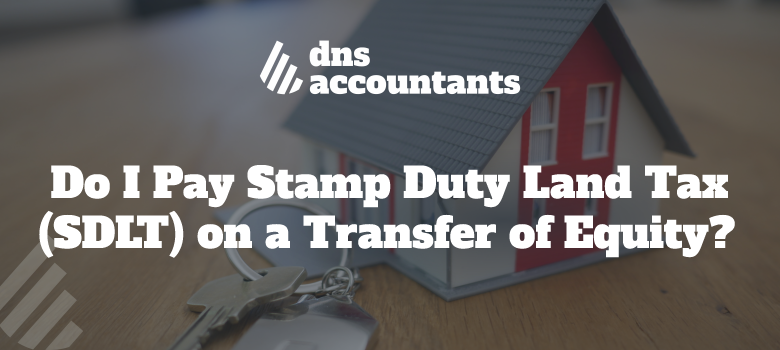
This is among the top questions in the minds of property owners looking to transfer their equity to joint owners. It is essential to consider all tax-related aspects before any such transaction.
When transferring equity of a property to another person, it is important to consider the implications of stamp duty land tax (SDLT). SDLT is a tax levied on the value of the property being transferred.
The amount of SDLT payable depends on various factors, including the value of the property and the chargeable consideration given for the transfer. Generally, if there is no monetary consideration involved in the transfer, such as a gift or nominal amount, SDLT may not be applicable. However, if there is any chargeable consideration, stamp duty payable must be assessed accordingly.
However, if any payment or consideration is involved, the SDLT liabilities should be carefully assessed based on the current SDLT rates and thresholds provided by the tax authorities.
Professional advice from a qualified tax professional is recommended to navigate the specific circumstances of the transfer and ensure compliance with the SDLT regulations.
The truth is that payment Stamp Duty Land Tax (SDLT) is subject to a lot of considerations. In some cases, it is payable, while it is not in some circumstances. Let us endeavour to understand the various aspects of transfers and the SDLT payable thereof.
Understanding Equity
Let us first understand what equity in land or property means. In simple terms, equity is the percentage one holds. In these transactions, it is the percentage of joint owner or holding in a property.
Equity refers to the portion of ownership an individual has in a property, expressed as a percentage. It is calculated by deducting the outstanding mortgage amount from the overall value of the property.
Equity represents the residual value of the property that belongs to the owner after all debts and obligations related to the property are settled.
This share of ownership grants individuals certain rights and benefits, including the ability to borrow against the property or sell it for profit. The higher the equity percentage, the greater the ownership stake and potential financial benefits for the property owner.
While discussing equity, two questions must be addressed.
What is meant by transfer of equity?
Transfer of equity is adding or removing people from ownership of property. This is transfer equity happens in two cases:
- The owner adds or removes at least one person from the title deed.
- The owner transfers all ownership to another person.
This is a legal process with any of the following outcomes:
- The property must have at least one owner.
- The property can have a maximum of four owners.
- There is no restriction on the number of people involved in the transfer process.
What circumstances lead to a transfer of equity?
Let us look at some common reasons for the transfer of equity in land or to transfer ownership of property.
- Marriage/ Civil Partnership
- Divorce/ Separation
- Addition of a new partner
- Change from joint ownership to single ownership or vice versa. This often involves jointly owned property, especially among unmarried couples and other joint owners.
- Buy-out spouse/ ex-partner
- Gifting share of the property to child/ grandchild Inheritance
- Purchase of property from a company
What is SDLT?
SDLT is the abbreviation for Stamp Duty Land Tax. It is payable to His Majesty Revenue and Customs (HMRC). Within the UK, SDLT is only applicable when one buys land or property in England and Northern Ireland when the market value exceeds the stamp duty threshold.
Laws in Scotland and Wales are different. Transfers in a property transfer title deeds attract LBTT (Land and Buildings Transaction Tax) in Scotland. In Wales, it is LTT (Land Transaction Tax).
SDLT is applicable on crossing the following thresholds:
- Residential property- GBP 250,000
- Residential property valued at GBP 625,000 or less (first-time buyer)- GBP 425,000
- Non-residential property- GBP 150,000
- Second property- GBP 40,000
Some considerations while calculating are:
- Amount being paid
- Amount of the mortgage/ debt
Depending on these points, payable SDLT is in increasing slabs of 0% (for up to GBP 250,000), 5% (for the next GBP 675,000), 10% (for the next GBP 575,000), and 12% (for GBP 1.5 million or over)
Property with mortgage
Whenever there is a mortgage on the property being transferred, the transferor must be released from the mortgage along with all its terms and conditions. This needs either clearing the outstanding mortgage, or transferring the debt. Since the amount of the pending mortgage is the equity of the bank/ building society in the property, they must agree to the transfer of the deed in writing. If a mortgage is involved, one of these options must be taken:
- Discharge or pay off the mortgage
- Refinance the mortgage
- Remortgage the property
- File for bankruptcy
- Take lenders approval to transfer as a buy-out
SDLT payable in different scenarios during the transfer of equity
Any transfer of property that crosses the threshold in England and Northern Ireland will attract SDLT. We will consider some situations to see if current threshold for SDLT is applicable or not. Additionally, it is important to consider capital gains tax implications, especially when transferring property ownership for estate planning or accessing tax benefits.
Marriage/ Civil Partnership
SDLT is payable when the amount crosses the threshold in case of marriage, civil partnership, or a move-in.
Divorce/ Separation
SDLT is not payable when the transfer of equity is done as part of an agreement/ court order in cases of divorce, annulment of marriage, and legal separation.
In accordance with current legislation, Stamp Duty Land Tax (SDLT) is exempt when the transfer of equity occurs as part of an agreement or court order pertaining to divorce, annulment of marriage, and legal separation.
This exemption serves to alleviate the financial burden on individuals involved in such proceedings and aims to facilitate the equitable division of property. It is essential to ensure compliance with the specific conditions outlined in the law to benefit from this exemption.
It is advisable to seek professional advice to understand these requirements and to properly navigate the transfer process in compliance with SDLT regulations.
Dissolved Civil Partnership
SDLT is not payable in cases where a civil partnership is dissolved due to an agreement/ Court order.
In cases where a civil partnership is dissolved due to an agreement or Court order, it appears that Stamp Duty Land Tax (SDLT) is not payable.
SDLT is a tax typically levied on land and property transactions in the United Kingdom. However, specific exemptions may apply in certain circumstances, such as the dissolution of a civil partnership.
It is important to consult with a qualified legal or tax professional to ensure accurate advice tailored to your specific situation and to determine if any other tax obligations or considerations may arise in relation to the dissolution of a civil partnership.
Gifting share of the property to child/ grandchild
Legally, when a property is gifted, there is no monetary transaction. Parents can give equity in a property or land to their children and grandchildren. The same consideration applies to gifting equity in a property to a spouse or civil partner. SDLT is not payable in these scenarios. However, you may need to pay land transaction tax depending on the region, such as Land and Buildings Transaction Tax (LBTT) in Scotland or Land Transaction Tax (LTT) in Wales.
Inheritance
If the transfer of equity is part of an inheritance or will of the person receiving the deceased, SDLT is not payable. This is applicable even in cases where the inheritor takes over the mortgage of the land or property from the date of death of the owner who made the transfer.
The answer to the question of whether Stamp Duty Land Tax (SDLT) is payable or not is dependent on scenarios and circumstances. Other than circumstances, the calculation of SDLT on equity transfer also involves mortgage debt associated with the property. It is always best to consult a Inheritance Tax professional and get expert advice while transferring equity in property or land.
